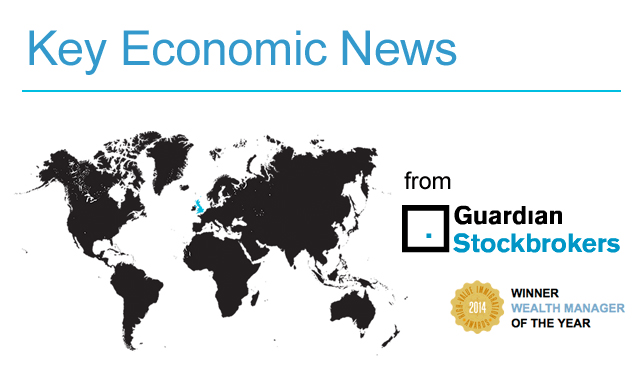The key points from today’s economic news, brought to you by Guardian Stockbrokers.

BoE Governor said Brexit is biggest risk to UK’s financial stability
Speaking to the members of Britain’s parliament about the country’s membership of the European Union, ahead of an in-out referendum on June 23, the Bank of England (BoE) Governor Mark Carney insisted that the central bank will not make any recommendations to the public on which way to vote. He stated that in the event of a vote for Brexit, the BoE will do everything in its capacity to discharge its responsibility to achieve monetary stability and financial stability. He referred the uncertainty surrounding the EU referendum as the biggest domestic risk to UK financial stability.
Euro-zone government expenditure advanced more than expected in 4Q 2015
On a QoQ basis, government expenditure climbed 0.60% in 4Q 2015, in the Euro-zone, compared to a revised advance of 0.30% in the previous quarter. Market anticipation was for government expenditure to climb 0.40%.
Euro-zone GDP rose as expected in 4Q 2015
On a QoQ basis in 4Q 2015, the seasonally adjusted final gross domestic product (GDP) climbed 0.30% in the Euro-zone, in line with market expectations. GDP had registered a similar rise in the previous quarter. The preliminary figures had also indicated an advance of 0.30%.
Euro-zone household consumption expenditure advanced less than expected in 4Q 2015
On a QoQ basis, household consumption expenditure advanced 0.20% in 4Q 2015, in the Euro-zone, less than market expectations for a rise of 0.30%. In the previous quarter, household consumption expenditure had climbed by a revised 0.50%.
Euro-zone gross fixed capital formation rose more than expected in 4Q 2015
The gross fixed capital formation registered a rise of 1.30% in the Euro-zone on a quarterly basis in 4Q 2015, more than market expectations for a rise of 0.60%. In the previous quarter, the gross fixed capital formation had registered a revised rise of 0.40%.
German industrial production advanced more than expected in January
The seasonally adjusted industrial production rose 3.30% on a MoM basis in January, in Germany, higher than market expectations for an advance of 0.50%. In the previous month, industrial production had dropped by a revised 0.30%.
German industrial production unexpectedly advanced in January
In Germany, the non-seasonally & working day adjusted industrial production unexpectedly rose 2.20% on an annual basis in January, compared to a revised drop of 1.30% in the previous month. Markets were anticipating industrial production to fall 1.60%.
French trade deficit widened in January
In January, trade deficit in France expanded to €3.71 billion, compared to a revised trade deficit of €3.68 billion in the prior month. Market anticipation was for the nation to register a trade deficit of €4.10 billion.
French imports registered a rise in January
In France, imports recorded a rise to €42.00 billion in January. Imports had registered a revised level of €41.80 billion in the previous month.
French exports rose in January
In January, exports advanced to €38.30 billion in France, compared to a revised reading of €38.10 billion in the prior month.
French current account deficit widened in January
In January, current account deficit in France rose to €1.40 billion. France had reported a revised current account deficit of €0.40 billion in the previous month.
French budget deficit dropped in January
Budget deficit in France dropped to €9.20 billion in January, following a budget deficit of €70.50 billion in the previous month.
Spanish calendar adjusted industrial output advanced less than expected in January
On an annual basis, the calendar adjusted industrial output rose 3.50% in January, in Spain, less than market expectations for a rise of 3.70%. In the previous month, the calendar adjusted industrial output had climbed by a revised 4.10%.
Swiss unemployment rate remained steady in February
The seasonally adjusted unemployment rate in Switzerland remained flat at 3.40% in February. Markets were anticipating unemployment rate to climb to 3.50%.
Swiss EU HICP advanced in February
In Switzerland, the EU harmonised consumer price index advanced 0.20% on a monthly basis, in February. The EU HICP had registered a drop of 0.70% in the prior month.
Swiss CPI registered an unexpected rise in February
In Switzerland, the consumer price index (CPI) unexpectedly climbed 0.20% on a MoM basis in February, compared to a drop of 0.40% in the previous month. Markets were anticipating the CPI to drop 0.10%.
Swiss unemployment rate declined surprisingly in February
The non-seasonally adjusted unemployment rate eased unexpectedly to a level of 3.70% in February, in Switzerland, compared to a reading of 3.80% in the previous month. Markets were expecting unemployment rate to record a steady reading.
Swiss CPI dropped less than expected in February
In February, the CPI fell 0.80% in Switzerland on an annual basis, lower than market expectations for a fall of 1.10%. The CPI had dropped 1.30% in the previous month.
Swiss EU HICP eased in February
The EU harmonised consumer price index recorded a drop of 0.90% in Switzerland on an annual basis, in February. The EU HICP had dropped 1.50% in the prior month.
US small business optimism index registered a surprise drop in February
In the US, the small business optimism index recorded an unexpected drop to 92.90 in February, compared to market expectations of an advance to a level of 94.00. The small business optimism index had registered a level of 93.90 in the prior month.
US Redbook index registered a rise in the last week
In the week ended 04 March 2016, on a MoM basis, the seasonally adjusted Redbook index in the US recorded a rise of 2.90%. In the prior week, the Redbook index had dropped 2.40%.
US Redbook index climbed in the last week
The Redbook index rose 0.70% in the US on an annual basis, in the week ended 04 March 2016. The Redbook index had climbed 0.60% in the prior week.
US composite leading indicator slid in January
In January, composite leading indicator registered a drop to 98.90 in the US, compared to a revised level of 99.00 in the prior month.
Canadian building permits dropped more than expected in January
In Canada, building permits registered a drop of 9.80% on a MoM basis in January, higher than market expectations for a fall of 2.30%. In the prior month, building permits had registered a revised rise of 7.70%.
Canadian housing starts rose in February
The seasonally adjusted housing starts advanced to 212.60 K in Canada, in February, higher than market expectations of an advance to a level of 180.00 K. In the prior month, housing starts had registered a revised level of 165.10 K.
Japanese M3 money supply rose less than expected in February
In Japan, M3 money supply registered a rise of 2.50% on an annual basis in February, lower than market expectations for a rise of 2.60%. In the previous month, M3 money supply had advanced by a revised 2.60%.
Japanese money supply M2+CD rose less than expected in February
Money supply M2+CD in Japan advanced 3.10% in February on a YoY basis, less than market expectations for an advance of 3.20%. Money supply M2+CD had risen 3.20% in the previous month.
Japanese corporate bankruptcies rose in February
Corporate bankruptcies in Japan recorded a rise of 4.47% in February on a YoY basis. In the previous month, corporate bankruptcies had dropped 6.38%.
Japanese Eco Watchers Survey for future outlook dropped in February
In Japan, Eco Watchers Survey for the future outlook registered a drop to 48.20 in February, compared to a level of 49.50 in the previous month. Market expectation was for Eco Watchers Survey for the future outlook to fall to a level of 49.30.
Japanese Eco Watchers Survey for current situation eased surprisingly in February
In February, Eco Watchers Survey for the current situation in Japan registered an unexpected drop to a level of 44.60, lower than market expectations of a rise to a level of 47.40. In the prior month, Eco Watchers Survey for the current situation had recorded a level of 46.60.
Japanese consumer confidence index recorded a drop in February
In February, the consumer confidence index registered a drop to 40.10 in Japan, compared to market expectations of a fall to a level of 42.20. In the previous month, the consumer confidence index had recorded a level of 42.50.
Click here to sign up for the in depth Guardian Stockbrokers Market Daily report.


 Hot Features
Hot Features













